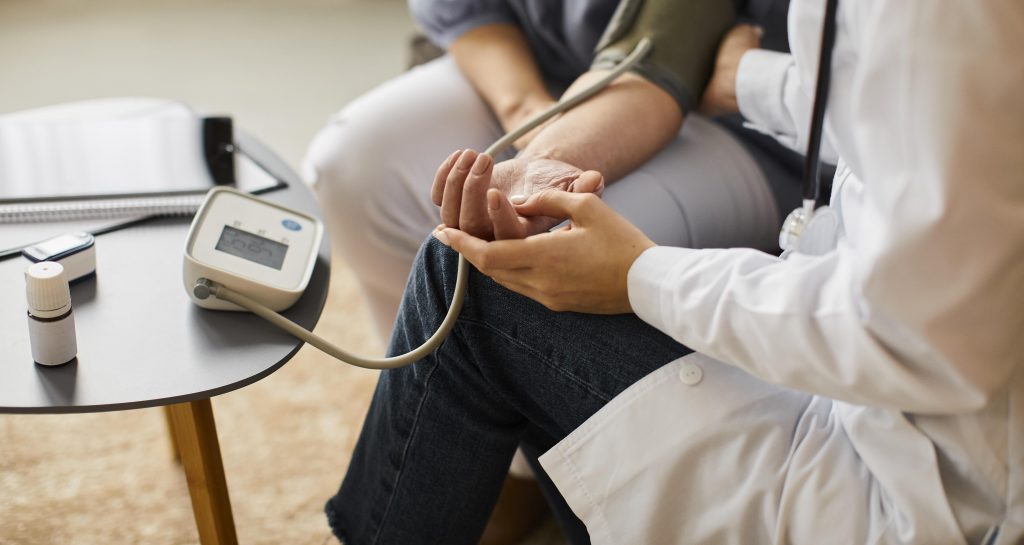There is no evidence that drinking water will lower your blood pressure, but the benefits of doing so may be worth investigating. According to Michael J. Blaha, director of clinical research at the Johns Hopkins Ciccarone Center for the Prevention of Heart Disease, “normal water consumption does not affect blood pressure.” This is because a healthy person’s body regulates water levels. By increasing the amount of water you drink, you may find that your blood pressure will drop.

Chronic dehydration
Chronic dehydration is one of the leading causes of high blood pressure. Lack of water cuts down on the energy supply to the brain, which leads to hypertension. As a result, the pituitary gland produces vasopressin, a hormone that raises blood pressure. A simple change in lifestyle can help lower blood stress and prevent this debilitating disease. It’s important to remember that high blood pressure is often asymptomatic and can be treated effectively and safely.
Reduce Stress
The benefits of drinking water may also include reduced stress. In addition to reducing the risk of cardiovascular disease, it can also help reduce high blood pressure. Sodium regulates the amount of water in cells. When you don’t drink enough water, your body shuts down capillary beds, causing greater pressure on your arteries and capillaries. Hence, dehydration increases the risk of stroke. The result is increased blood pressure and thicker blood. As the heart tries to squeeze this thick blood through the aorta, it must squeeze it out of the bend, raising the risk of cardiac arrest or heart attack.
Lower your Blood Pressure
Although drinking plenty of water may seem like an obvious step to take to lower your blood pressure, it is often underestimated how important it is for your overall health. Not only is staying hydrated beneficial for your general health, but it can also help lower your blood pressure. Harvard Health Publishing suggests that a person should drink four to six glasses of water every day and the Mayo Clinic recommends drinking at least 11.5 cups of fluid per day. Moreover, water is sugar, caffeine, and preservative free. It offers a wide variety of other health benefits, so why not start drinking more of it?
Water can also help you lower your blood pressure. It helps the body move nutrients and eliminates bacteria. In fact, it helps prevent constipation and improves digestion. Also, it cushions the joints and protects organs. In addition, it can reduce your risk of developing heart disease, a heart attack, and other serious health conditions. By drinking water regularly, you can normalize your blood pressure and reduce the risk of high blood pressure.
Benefits of Drinking Water
There are several benefits of drinking water.
- It can help reduce your blood pressure by diluting the plasma in the vessels that lead away from the duodenum.
- It also helps lower your blood pressure by increasing sympathetic nervous system activity. Moreover, it can lower your cholesterol levels. This is the reason why water has many health benefits.
- However, drinking a lot of water will not make you feel better, and a healthy heart is a healthy heart.
- It reduces sodium retention, and helps avoid dehydration.
- When your body is dehydrated, your capillary beds will close, putting more pressure on your arteries and capillaries.
- If you drink lots of water, your blood pressure will decrease. The benefits of drinking water are numerous.
- By drinking water, you will improve your cardiovascular health. Additionally, it will reduce your risk of developing high blood pressure.
- It thins the blood and keeps the muscles from squeezing the blood vessels. It also detoxifies your body. Salty water has less sodium than freshwater and lowers your overall blood pressure. It also lowers your blood pressure by taking pressure off of the kidneys. A healthy diet consists of plenty of fruits and vegetables. The minerals in these foods help to keep your pressure low.
Conclusion
The study found that drinking water lowers blood pressure when it is mixed with salt. The researchers looked at two studies in coastal Bangladesh. They found that mildly salinated water reduced systolic and diastolic numbers. The water also lowers blood pressure in people who had high blood pressure before. In the long run, the findings may benefit everyone. So, drink up! If you haven’t been drinking plenty of water lately, start today.